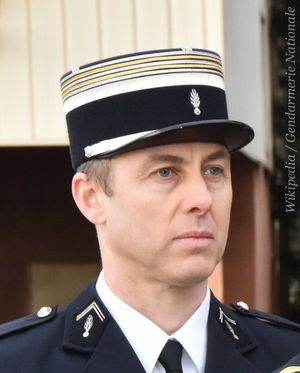Just days before Easter 2018, Redouane Lakdim, a 25-year-old Moroccan criminal, opened fire on passengers in a car in southern France, killing one. Minutes later he fired on a group of police officers who were jogging near the castle in Carcassonne.
He then drove to the town of Trèbes and stormed a supermarket, shooting dead the shop’s butcher and a customer, a retired bricklayer, whilst screaming ‘Allahu akbar’.
Police arrived shortly after the start of the siege, managing to get some people out. But the attacker kept one woman hostage.
It was then that Arnaud Beltrame, a 44 year old lieutenant-colonel in the gendarmerie, offered to take the woman’s place and remain holed up with Lakdim while negotiations continued.
Mr. Beltame left his telephone switched on to allow the police to listen in. He had serviced in Iraq, was among the elite police special forces but, having traded places with the hostage, he was shot in the neck and died some hours later.
Arnaud’s brother Cédric said, ‘He gave his life for someone else; for a stranger.’
Just before Passover, around 33AD, another man willingly exchanged his life for people who have been taken hostage.
Four people died, and 16 more were injured in the Easter rampage in France. But Jesus gave his life for the countless millions who have been held captive by our inability to consistently do right.
When Jesus was asked which is the greatest commandment, he replied, ‘Love the Lord your God with all your heart and with all your soul and with all your mind …And the second is like it: ‘Love your neighbour as yourself.’’
He was summarising the Ten Commandments. They tell us what is right, and they show us that we are wrong!
Breaking the commandments is sin, and we all are held hostage by it. Sin cuts us off from God, it will keep us out of heaven, and it will condemn us to hell. If we could see it, our situation is grim.
But this is why Jesus stepped in to seek and to save us. He came from heaven to earth, and allowed himself to be crucified. He had gone about and done good. He had healed the sick, raised the dead, fed the hungry, calmed the storm at sea, and lived a totally perfect life. Yet, at 33 years of age, he allowed himself to be crucified.
In his hours of immense suffering, Jesus carried the can for all who are taken hostage by sin and the devil. He became the sacrifice for the sin of the world. He took our place as he carried on himself all our wrong, paying the penalty it would take us eternity to pay.
In France, Julie, the 40-year old, freed hostage reflected on what had happened: ‘He gave his life for me; he was killed so that I could live.’ But, though she can thank Arnaud’s family, she cannot thank Arnaud. He has gone.
It is different for us. Whoever we are, we can thank Jesus for his love, and his cruel, sacrificial death, because he is alive.
Three days after his death and burial, Jesus rose again. The Messiah had died for our sins, was buried, and was raised from the dead, exactly as all the Bible prophecies said he would.
Jesus presented himself alive to literally hundreds of people, some who initially were reluctant to believe. 40 days later he ascended back to his home in heaven.
How Julie’s life will be affected is yet to be seen. But how does God’s love and great act of rescue impact you? Today, will you thank him for dying to save you? Will you ask him to forgive you? Will you ask him, by his Spirit, to come into your life? Will you trust him as your Lord and Saviour?
What you do with the risen Jesus will determine your whole eternity. Count Ludwig von Zinzendorf was from a noble 18th century German family. While on his ‘Grand Tour’, in which young aristocrats were introduced to royal courts around Europe, Count Zinzendorf viewed in the Dusseldorf museum a painting by Domenico Feti depicting Christ’s suffering.
The painting, titled ‘Ecce Homo’ (‘Behold the Man’), had a caption underneath: ‘This have I suffered for you; now what will you do for me?’
Young Count Zinzendorf was moved in a profound way. He came to an intensely personal faith in Christ, which radically transformed him and was to impact all of Europe at that time.
What God wants of you and me, is that we might believe in him. As you trust him he becomes your Lord and Saviour, and you will find that you want to follow Jesus in all you do and think and say.
Surely, that is the reasonable response to the great act whereby Jesus gave himself to set us free.
Roger Carswell Travelling evangelist and author.




